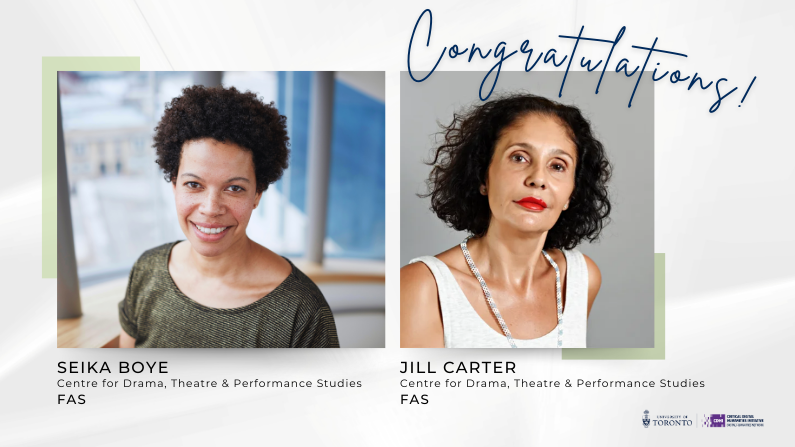Gatherings: Archival and Oral Histories of Performance awarded a Social Sciences and Humanities Research Council of Canada Partnership Grant for $2,500,000.00.
CDHI is very pleased to announce that the research project Gatherings: Archival and Oral Histories of Performance has been successful in its application for a full Partnership Grant from SSHRC. CDHI members, Professors Seika Boye and Jill Carter (Centre for Drama, Theatre, & Performance Studies, FAS), are Co-Investigators and Project Co-Directors.
CDHI has supported Professor Seika Boye’s research through our UX Design for DH Accelerator program and our Emerging Projects Fund. Through the Accelerator, we redesigned and relaunched the website and digital archive for It’s About Time: Dancing Black Canada, 1900-1970. With the support of the Emerging Project Fund, Seika has investigated graphic recording as an inclusive and person-centred approach to creatively engaging with oral histories of Black dancers and dance data. Seika will continue this research through the Gatherings project.
Professor Jill Carter received a CDHI Emerging Project Grant, along with co-PI Professor Jon Johnson, to lead the project “Developing a New First Story Toronto Website.” Their collaboration uses digital media to foster ethical relationships with Indigenous peoples, land, and knowledge, facilitating an online process of ethical witnessing and encouraging reciprocal commitments with Indigenous communities.
Researchers from across the country have made the Gatherings project a success, including the following Co-Investigators and Collaborators: Stephen Johnson (Principal Investigator); Roberta Barker, Justin Blum, Amy Bowring, Seika Boye, Jill Carter, Jenn Cole, Heather Davis-Fisch, Heather Fitzsimmons Frey, Annie Gibson, Gabrielle Houle, Kelsey Jacobson, Matthew Jones, Sasha Kovacs, Martin Julien, Allan Lindgren, Christine Mazumdar, Maria Meindl, Jimena Ortuzar, Jenny Salisbury, Mark Turner, Michael Wallace, Jessica Watkin, and Sanja Vodovnik.
Affiliated Academic Institutions include: University of Victoria; University of Lethbridge; MacEwan University; Toronto Metropolitan University; Sheridan College Institute of Technology; University of Toronto; Trent University; Queen’s University; Memorial University of Newfoundland; and Dalhousie University.
Our Heritage and Artistic Partners include: Canada’s Theatre Museum; Playwrights Canada Press; Dance Collection Danse; the Art Gallery of Ontario; Fort Edmonton Park; Elgin County Museum and Archives; Directors Lab North; Inuit Art Foundation; Nanaimo Museum; OkâlaKatiget Society; Nozhem First Peoples Performance Space; Deep River Schoolhouse Museum; the ArQuives. The project anticipates adding additional partners as the project develops.
A full list of all those involved as the project begins can be found on the SSHRC website.
A Statement about the Project:
Across the territories commonly referred to as “Canada,” people of all cultures — Indigenous, newcomer and settler — have always practiced performance. In distinctive languages and varied contexts, performance has been used to reinforce and to disturb community values, as communities speak both to themselves, and to one another. The study of performance history is the study of history itself, and studying history through the lens of performance enriches understanding of the many cultures present in these territories.
While other arts may generate objects such as paintings, sculptures and physical books, performance is fundamentally an event, both ephemeral and immaterial. By neglecting this difference, scholarship and archival practices have missed out on the nuances and complexities of performance history, and the contributions of many groups have been left out of the conversation altogether. These include Black, racialized and Indigenous communities, LGBTQ2S+ communities and people with disabilities. Popular and community supported performance is often overlooked. So are dance, improvised performance, and the many other forms of performance which do not leave behind scripts.
Gatherings: Archival and Oral Histories of Performance responds to these interconnected issues by developing and mobilizing knowledge about the unique nature of performance. We plan to create a partnership consisting of: artists, researchers, galleries, libraries, archives and museums (GLAM), universities and community partners, with the support of three advocacy organizations (Canada’s Theatre Museum/Musée canadien du théâtre; Playwrights Canada Press; and Dance Collection Danse).
Our objectives are threefold:
1) to promote access to archival performance history research;
2) To implement ethical practices in oral history collection and preservation;
3) To apply advances in digital humanities scholarship, enhancing public access to diverse performance histories.
We will experiment with new methodological approaches in performance research, while applying theoretical advances in the fields of race, gender, and Indigenous studies. These activities will foster lasting connections and build capacity for scholars, partner organizations, artists and the audiences they serve.
Research will be disseminated through a range of scholarly channels: publication, symposia, conferences, publicly advertised and accessible workshops, as well as creative events and exhibitions at both the regional and national levels. Through reciprocally beneficial partnerships, the intangible cultural heritage of performance will be reactivated—for a new generation of scholars, artists, curators and publics, building awareness of the critical role performance has played, and continues to play, in shaping and reimagining societies in these lands.

